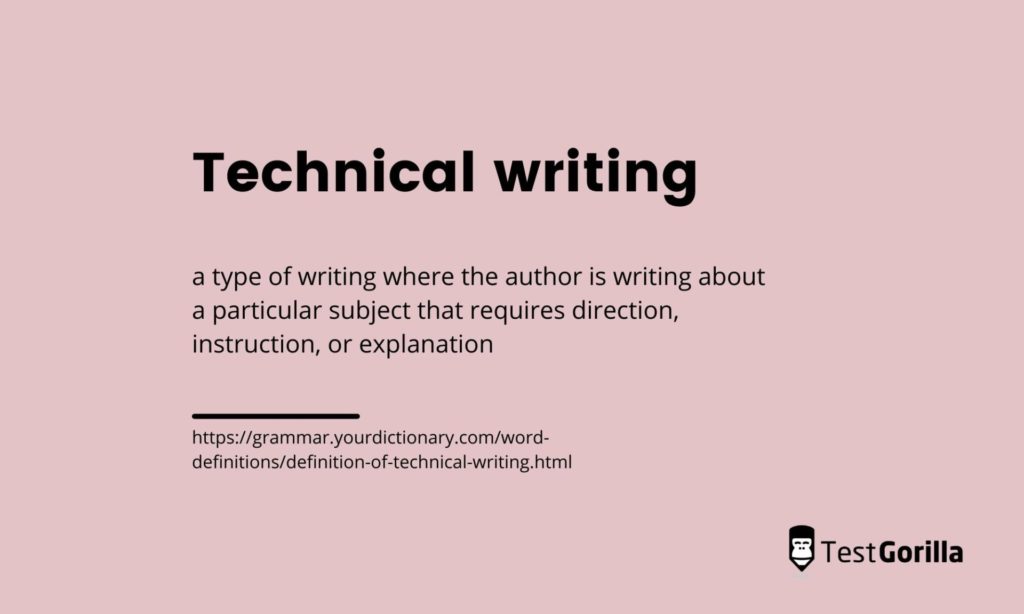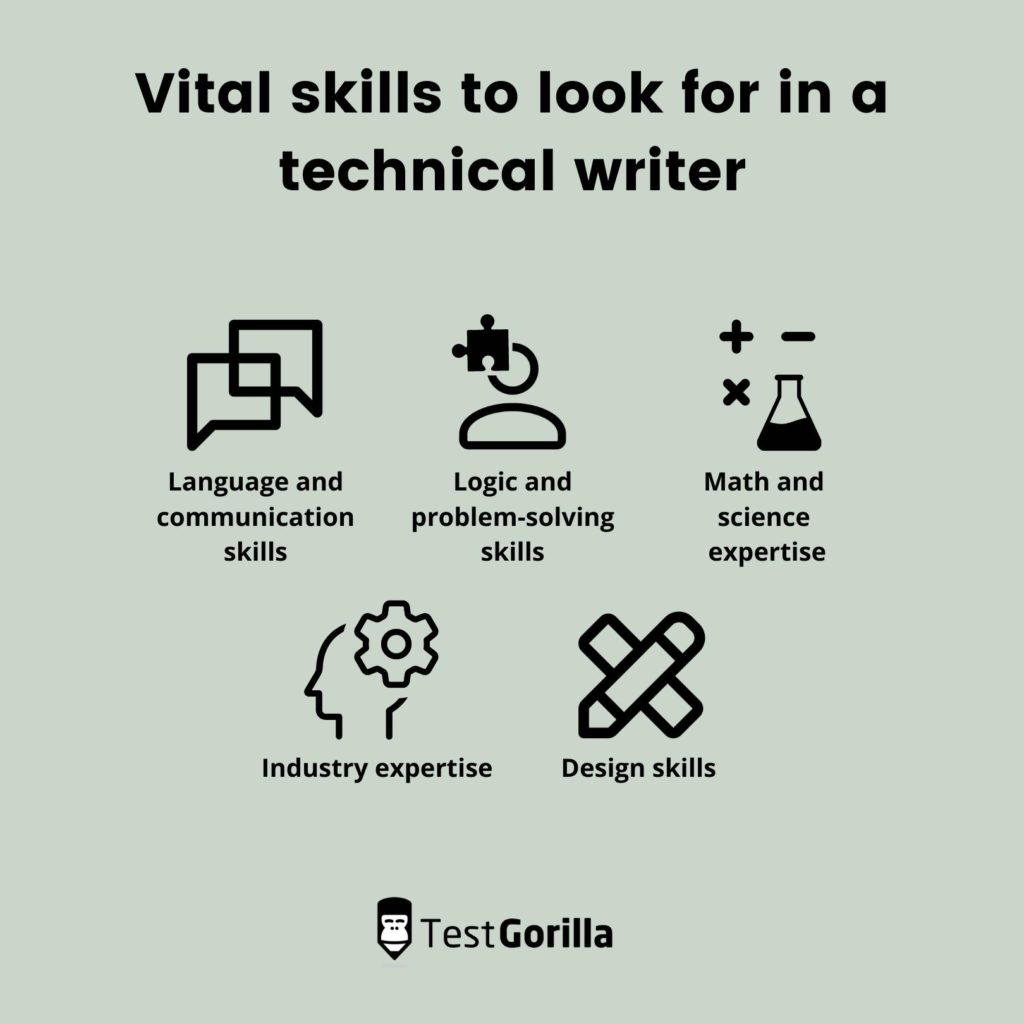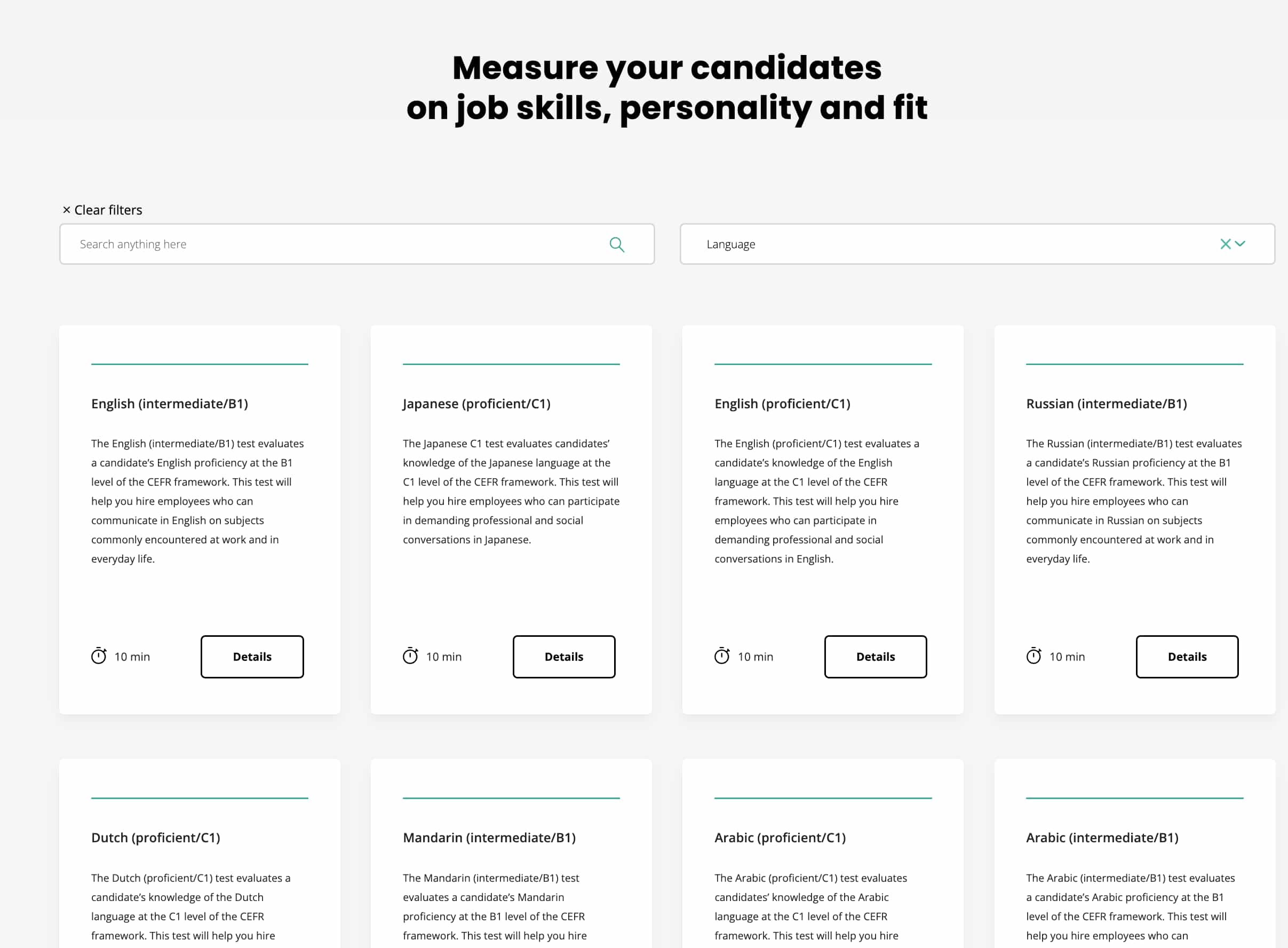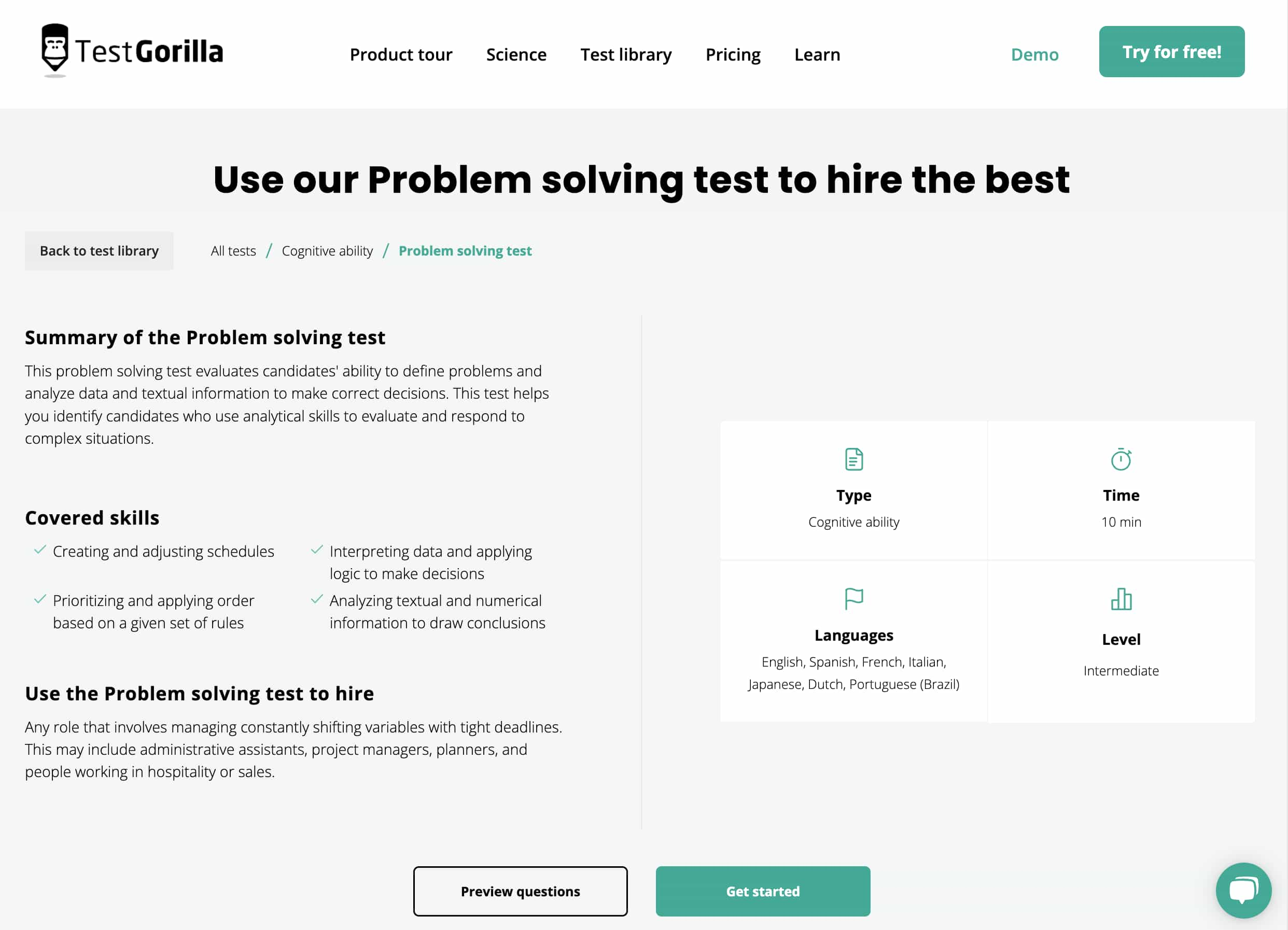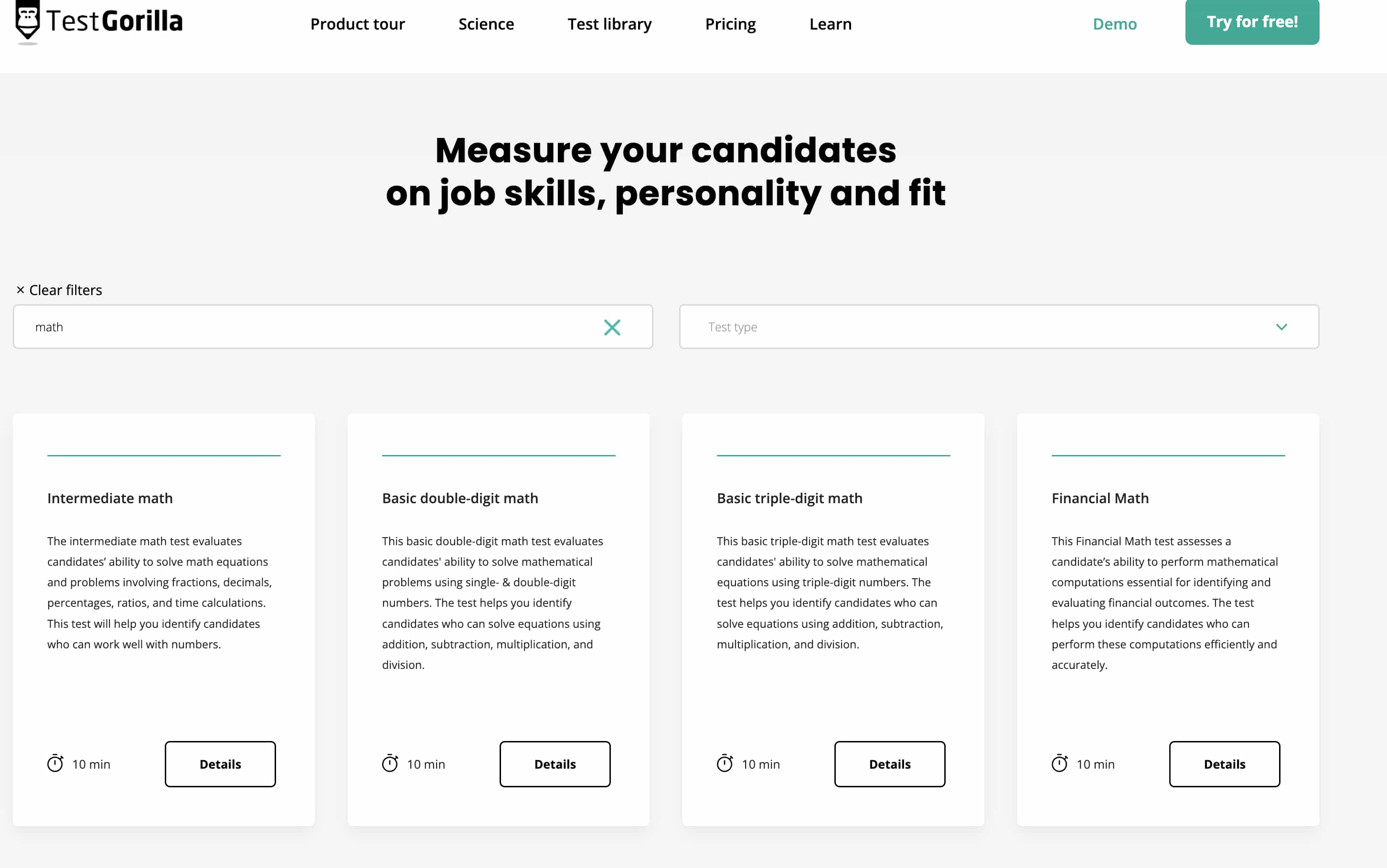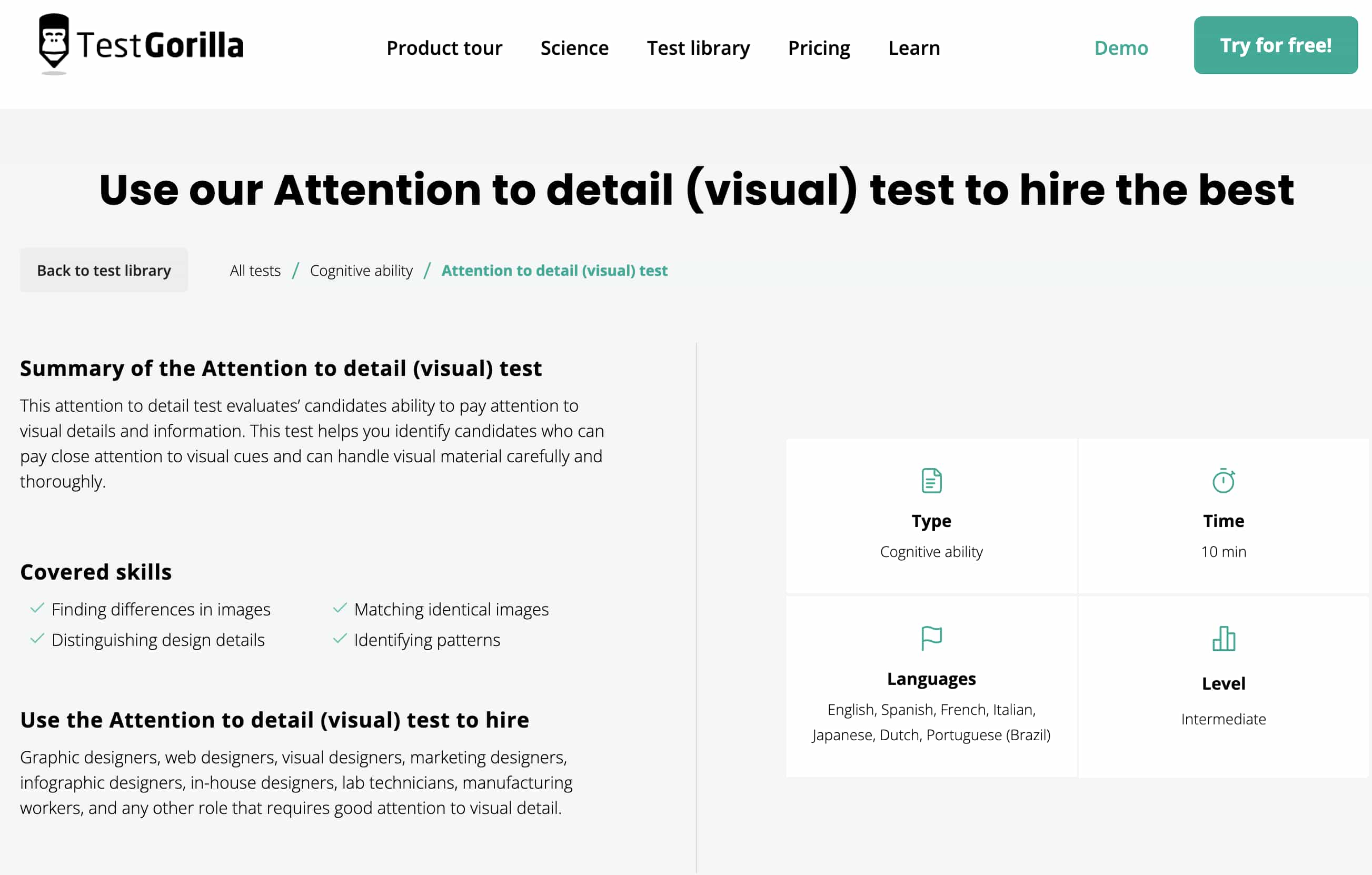A great technical writer must have a rare balance of writing skills, communication abilities, impeccable logic, in-depth technical knowledge, and an eye for design.
Wading through dozens of technical writers’ portfolios can be a daunting task for your recruitment team—especially if you’re unfamiliar with the subject matter.
Can you really tell how accurately a candidate’s 300-page technical manual was written?
To make your task a little less daunting, we’ve compiled a helpful list of skills to look for in a technical writer plus helpful tips on technical writing assessment.
We’ve also included the corresponding skills tests from the TestGorilla test library to help you hire a technical writer confidently.
Technical writing definition
What is technical writing?
Technical writing is the art of drafting precise communication about any technical subject or field. The primary goal of technical writing is to convey information as simply and accurately as possible.
For most companies, your technical writer will be the bridge between your product experts and your audience.
That said, not all technical writing is customer-facing—some technical writers work on internal documentation, such as capturing product requirements for developers.
Technical writing is defined by both the subject matter and the writing style. The subject matter must be for a technical or occupational field, such as computer software, medicine, machinery, or finance.
Most technical writing comes in the form of online or print help documentation, tutorials, and instructions. Technical writers may also be responsible for datasheets, whitepapers, press releases, business proposals, product descriptions, and more.
If information is complicated and needs to be in writing, it’s a job for a technical writer.
Why and when should you hire a technical writer?
A technical writer differs drastically from a traditional copywriter or content marketer in that their goal is not to editorialize but instead to convey information clearly and precisely.
Just because your company or your customers work in a technical field doesn’t necessarily mean your first writing hire should be a technical writer. It depends entirely on your goals.
Here are some situations in which you should hire a technical writer:
To support your customers with clear product documentation or tutorials
To support your marketing efforts with in-depth subject matter expertise
To support your developers with clear business requirements or product standards
To support your sales with technical case studies or sales proposals
Despite the many benefits of hiring technical writers, many companies make the mistake of recruiting them too late. On the surface, it may sound logical to develop a product and then hire a technical writer to document the product.
However, technical writers can create value from the start of your development cycle. For example, they may help you better understand user requirements or unearth additional use cases. If they’re hired later in the process, not only do they have to play catch-up to gain a full understanding of your product, but you’ll also lose out on their technical expertise along the way.
The best insights on HR and recruitment, delivered to your inbox.
Biweekly updates. No spam. Unsubscribe any time.
Vital skills to look for in a technical writer
When hiring a technical writer, you need to vet them for the right balance of technical and soft skills. Unfortunately, it’s tough to validate that candidates have many of these skills by looking at their resumes alone.
It can also be tough to assess a technical writer’s portfolio or writing samples, given that most technical writing goes through several rounds of revisions by one or more professional editors.
Luckily, pre-employment assessment platforms like TestGorilla allow you to test technical writers on the skills they need to succeed in the role.
Here are some key skills to look for in a technical writer, as well as tests you can use to assess their skills. Once you’ve identified the most important skills, you can use them to craft the perfect job description.
Language and communication skills
Let’s start with the obvious: Your technical writer needs strong writing, language, and communication skills.
Language proficiency – Technical writers require native or native-like writing skills to accurately convey technical information, so use language proficiency tests to assess your candidates’ language abilities. For example, you can test their proficiency in English, French, Mandarin, and more.
Communication – A technical writer must be a great listener with the ability to interpret both written and verbal communication. They must also be a great communicator and be able to summarize complex information in simple terms.
Attention to textual detail – Technical writers need to digest intricate written details, spot tiny errors, identify inconsistencies, and mentally process complicated documentation.
Reading comprehension – Technical writers also need the ability to pull out the crucial takeaways or facts from lengthy documents.
Easily assess a technical writers’ language proficiency
We’ve written an entire guide to testing candidate’s language proficiency so that you can make the best hire, every time. Go to guide.
Logic and problem-solving skills
Beyond communicating and writing clearly, technical writers must possess the ability to construct logical flows of information, including algorithms, step-by-step instructions, and digestible data reports.
Critical thinking – Technical writers must have solid deductive reasoning skills and the ability to make sound conclusions based on the information at hand.
Problem solving – Technical writing is all about defining a problem for the reader, breaking it down into manageable parts, and providing a solution.
Working with data – Whether they’re analyzing client data for product developers, creating graphs and charts, or writing reports, technical writers are always working with data. Therefore, technical writers must be scientifically minded and experienced when it comes to data management.
Verbal reasoning – Much like reading comprehension, verbal reasoning is the ability to reach valid conclusions based on text. However, verbal reasoning also includes logical components, such as using the written word to draw analogies—an essential skill when simplifying complicated subjects.
Numerical reasoning – Numerical reasoning is the ability to draw valid conclusions from data. This means interpreting graphs, identifying patterns, and predicting trends. This is a necessary skill if your technical writer will be producing number-heavy reports.
Math and science expertise
Many technical writers find themselves in math- or science-heavy fields, such as finance, engineering, robotics, or electronics. If your company is in such a field, you’ll want your technical writer to be a math wiz.
Intermediate math – Not only must technical writers be able to do math, but they also have to be able to explain it to others. Therefore, advanced math skills are a must-have.
Data science – Whether your company deals directly with data science or not, artificial intelligence is creeping its way into every corner of business. Therefore, most technical writers need an understanding of data science and programming fundamentals, including statistics, machine learning, and neural networks and deep learning.
Mechanical reasoning – Most technical documentation for industrial machinery or scientific equipment requires a deep understanding of mechanical and physical concepts, such as force, movement, velocity, and mechanisms like pulleys, gears, and wheels.
Spatial reasoning – Technical writing for fields in STEM (Science, Technology, Engineering, and Math) requires the ability to create and analyze two- and three-dimensional objects and diagrams.
Industry expertise
Your technical writer also requires in-depth knowledge of your field. You can assess a candidate’s industry knowledge through various types of tests, including:
Role-specific tests: e.g., software engineer or WordPress developer
Product knowledge tests: e.g., Shopify, Microsoft Azure, or Salesforce CRM
Coding knowledge tests: e.g., JavaScript entry-level algorithms or Python debugging
Design skills
If you don’t have an in-house designer, the technical writing role may also require the writer to design documents themselves.
At the very least, it’s helpful for your technical writer to have an eye for design to be able to communicate what the end product should look like or to provide quality assurance for the final document.
Attention to visual detail – This skill allows your writer to identify small details or tiny errors that could have a big impact on the end product.
UX/UI design – If your company develops software, it helps for your technical writer to have a solid understanding of UX/UI best practices and terminology.
Adobe Illustrator or Adobe Photoshop – If your technical writer needs to create graphics, they’ll require strong knowledge of the Adobe suite.
Other helpful skills
In addition to skills that are helpful for every role, such as culture add or time management, technical writers should also have the following skills:
Project management – For prioritizing and triaging business requirements
SEO copywriting & Technical SEO – For writing search-engine-friendly online documentation
Microsoft Word & Microsoft Excel – For efficient text or data processing
Should you hire an in-house technical writer or a contractor?
Once you’ve defined your ideal technical writer, there’s still the question of whether to hire an in-house writer or a contractor.
If you’re a big company with a large and consistent volume of work, you’re likely better off hiring an in-house technical writer. Having a writer in-house makes it easier for them to collaborate with your team, gives them more time to develop in-depth knowledge of your product, and often costs less than paying a freelancer.
On the other hand, hiring ghostwriters or freelancers may be the better option if you have fluctuating or inconsistent project volumes , require a wider variety of subject matter expertise and want to avoid operational costs and additional headcount. For example, there are agencies that can supply on-demand technical writers depending on the subject matter.
You can also consider a combination of the two. For example, you may have a senior technical content writer who manages their fluctuating workload by assigning overflow tasks to contractors.
If you’re hiring an in-house technical writer, you can recruit through typical job boards or boards specific to technical writing, such as the Write the Docs Job Board.
If you’re looking for a contract technical writer, you can seek out the help of a technical writing agency or post a job on freelance platforms, like Upwork, Toptal, or Guru.
How to find and hire technical writers
Here are the steps to find and hire technical writers:
1. Determine your needs
Before looking for technical writers, you need to understand what you’re looking for in terms of skills, experience, and the specific types of projects they’ll be working on. This will help narrow down your search and find the right candidates for the job.
2. Define the job role and responsibilities
Once you know what you’re looking for, you’ll need to create a job description that clearly outlines the role and responsibilities of the technical writer. This will help potential candidates understand the job and whether they’re a good fit for the position.
3. Source candidates
There are several ways to find technical writers, including posting job ads on job boards and online platforms, reaching out to relevant professional organizations and communities, or partnering with a recruiting agency.
4. Review resumes and cover letters
Once you have a pool of candidates, it’s time to review their resumes and cover letters to get a sense of their skills and experience. Look for candidates with relevant technical writing experience, strong writing skills, and the ability to clearly and concisely convey complex information.
5. Conduct interviews
After reviewing resumes and cover letters, you’ll want to conduct interviews to better understand the candidates’ fit for the role and the company. During the interview, you can ask about their technical writing experience, writing style and process, and ability to work with technical subject matter experts.
6. Use pre-employment assessments to screen your technical writer candidates
To further screen candidates, use pre-employment assessments, such as writing samples or aptitude tests, to determine their fit for the role. These assessments can help you identify candidates with the skills and abilities needed to succeed as a technical writer.
Learn more about candidate assessment software in 11 best candidate assessment software (& why you need one).
7. Make an offer
Once you’ve identified the best candidate for the job, it’s time to make an offer. Be sure to clearly outline the terms of the offer, including the salary, benefits, and other details important to the candidate.
By following these steps, you can find and hire technical writers who are a good fit for your company and the specific needs of your projects.
Hire better technical writers, faster, with TestGorilla
Testing your technical writing candidates through pre-employment assessments is the only way to get a complete picture of their writing and communication abilities, technical knowledge, and design skills.
If you want to hire better technical writers, faster and bias-free, start building your own assessments with TestGorilla today.
Still unsure about skills testing? Go to our guide on everything recruiters need to know about candidate skills assessment tests.
You've scrolled this far
Why not try TestGorilla for free, and see what happens when you put skills first.


